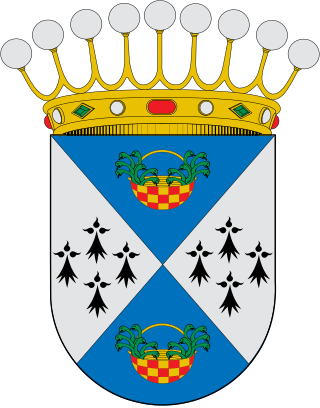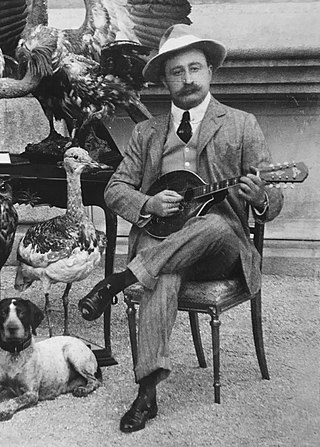Menezes, sometimes Meneses, was originally a Portuguese toponymic surname which originated in Montes Torozos, a region in Tierra de Campos, northeast of Valladolid and southeast of Palencia. The ancestor of the Meneses lineage was Tello Pérez de Meneses. The family wealth and power grew remarkably in the 13th and 14th centuries, through several marriages with the Castilian and Portuguese royal families.
The highest hereditary title in the Portuguese nobility. By tradition, there are a total of five royal and seven non-royal dukes in Portugal, out of 28 dukedoms that have ever been created. In the majority of cases, the title of duke was attributed to members of the high nobility, usually relatives of the Portuguese royal family, such as the second son of a monarch.

Count of Cantanhede was a Portuguese title of nobility created by a royal decree, dated from 6 August 1479, by King Afonso V of Portugal, and granted to D. Pedro de Menezes, 5th Lord of Cantanhede.

Duke of Medinaceli is an hereditary title in the peerage of Spain, accompanied by the dignity of Grandee. The Catholic Monarchs, Ferdinand II of Aragon and Isabella I of Castile, created the title and awarded it on 31 October 1479 to Luis de la Cerda y de la Vega. He also held the title of 5th Count of Medinaceli, which was first awarded in 1368 to his ancestor, Bernal de Foix.
The Sicilian title Duke of Bivona stems from the middle 16th century. Bivona is in Sicily, which had been conquered by Peter III of Aragon in 1282. It was given to people related to the powerful medieval Aragonese family of Luna, Zaragoza.

Duke of Caminha was a title created by royal decree, dated 14 December 1620, by King Philip III of Portugal for Dom Miguel Luís de Menezes, 6th Marquis of Vila Real and 8th Count of Vila Real. He was the eldest son of Manuel de Menezes, Duke of Vila Real.

Duke of Vila Real was a Portuguese title of nobility created by royal decree, dated from February 28, 1585, by King Philip I of Portugal, and granted to Dom Manuel de Menezes, 5th Marquis of Vila Real and 7th Count of Vila Real.

Marquis of Vila Real was a Portuguese title of nobility created by a royal decree, dated from 1 March 1489, by King John II of Portugal, and granted to Dom Pedro de Menezes, also known as Peter II of Menezes, 3rd Count of Vila Real.

Count of Ourém is a Portuguese title granted in 1370 by King Fernando I of Portugal, to Dom João Afonso Telo, uncle of Queen Leonor Teles. Later he also became the fourth Count of Barcelos.

Count of Vila Real was a Portuguese title of nobility created by a royal decree, in 1424, by King John I of Portugal, and granted to Dom Pedro de Menezes, also known as Peter I of Menezes, 2nd Count of Viana.

Count of Valença was a Portuguese title of nobility, created by a royal decree, dated from July 20, 1464, by King Afonso V of Portugal, and granted to Dom Henrique de Menezes, who was already 3rd Count of Viana and 4th Count of Viana.
Manuel of Menezes was the second son of Pedro de Menezes 5th Marquis of Vila Real and of his wife, Beatrice of Lara.
DoñaVictoria Eugenia Fernández de Córdoba y Fernández de Henestrosa, 18th Duchess of Medinaceli, GE was a Spanish noblewoman and Grandee of Spain. She was the head of the Spanish noble House of Medinaceli and patron of the Ducal House of Medinaceli Foundation. In addition to her most senior title of Duchess of Medinaceli, she held an additional 49 other hereditary noble titles during her lifetime, making her the second-most titled noblewoman in Spain, just after Cayetana Fitz-James Stuart, 18th Duchess of Alba. She died in Seville on 18 August 2013, aged 96.

Duke of Camiña is a hereditary title in the Peerage of Spain accompanied by the dignity of Grandee, granted in 1619 by Philip III to a Portuguese aristocrat, Miguel de Meneses, 2nd Duke of Vila Real in the peerage of Portugal.

Pedro de Menezes Portocarrero, was a 15th-century Portuguese nobleman and military figure. Pedro de Menezes was the 2nd Count of Viana do Alentejo, 1st Count of Vila Real and the first Portuguese governor of Ceuta.
Dona Beatriz de Menezes was a Portuguese noblewoman. She was the 2nd Countess of Vila Real from 1437, a title she shared with her consort, Fernando de Noronha.
The Count of Valadares is a noble title created by King Pedro II of Portugal, by royal letter on 20 June 1702, in favour of D. Miguel Luís de Menezes.
Count of Redondo was a Portuguese title of nobility created by a royal decree, in 1481, by King Manuel I of Portugal, and granted to D. Vasco Coutinho, the son of Fernando Coutinho, Marshall of Portugal.

Count of Teba is a hereditary title in the Peerage of Spain, granted in 1522 by Charles I to Diego Ramírez de Guzmán, son of the 1st Lord of Teba. The name makes reference to the municipality of Teba, in Málaga, Spain.

Luis Jesús Fernández de Córdoba y Salabert, 17th Duke of Medinaceli, GE, was a Spanish nobleman and trophy hunter. He was born the world's most titled person since his father, the 16th Duke, had died months before in a hunting accident. He was 11 times a duke, 17 a marquess, 15 a count and 4 a viscount.









